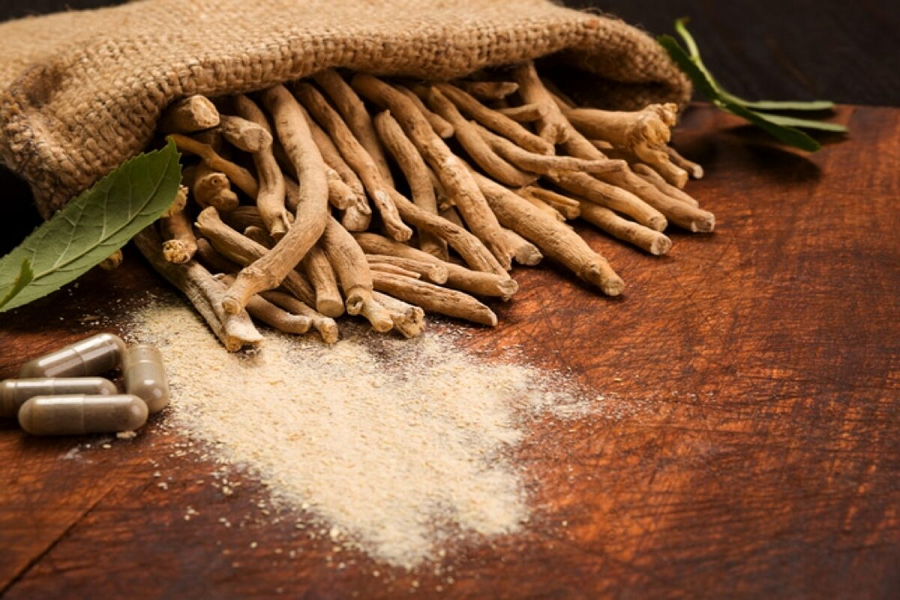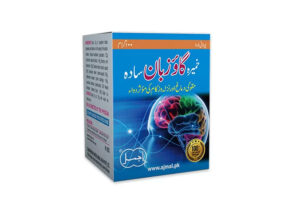Ashwagandha is a root, and it’s considered a tonic—a substance that helps fortify the body and restore health. Ayurvedic medicine it’s prescribed for people who are physically and emotionally exhausted or who have trouble sleeping. Incidentally, the word ashwagandha comes from two Sanskrit words: “ashwa,” meaning horse, and “gandha,” meaning smell. So it’s called “the smell of a horse”—but that doesn’t mean it smells terrible! It gets this name because it’s said to confer the vigor of a stallion.
Ayurvedic Belief
In Ayurveda, the science of life, Ashwagandha is known as a “Rasayana.” It’s believed that this herb balances the doshas (the three forces in the body) and that it supports longevity. In general, herbs and foods are classified by how they affect the qualities of the doshas: hot or cold, dry or oily. If you have Vata dosha (qualities that include coolness, dryness, and lightness), you may want to avoid Ashwagandha since it’s warm and heavy. But if you’re Kapha (heavy and cool) or Pitta (hot and oily), you may benefit from Ashwagandha!
Usage
It grows primarily in dry regions, and it’s been used for thousands of years by people who would grind its roots into a paste and apply it topically for conditions like inflammation, rheumatism, backache, skin ulcers, sciatica, nerve pain, arthritis, and more.
-
Internal
For internal use, practitioners have historically recommended ashwagandha for insomnia, memory issues, stress management, sexual dysfunction, fatigue, weakness after an illness or trauma, and even cancer and chronic pain.
-
External
The root is so highly valued in traditional medicine because it contains potent compounds called withanolides—but don’t let the long word scare you! These are just molecules that give the plant adaptogenic properties—which means they help your body deal with external factors like stressors or pathogens.
How to Use
The first step to a genuine mind/body connection is to stop pretending that the two can ever be separated. Ancient Indian cultures have been practicing holistic medicine for centuries. Part of their approach includes using herbs like Ashwagandha for treating anxiety and stress and boosting the immune system. All these things work together—when one is off-balance, the rest follow suit.
The best way to consume Ashwagandha is in the form of a supplement, be it Ashwagandha powder, ashwagandha capsule, ashwagandha tea or ashwagandha juice.
Ashwagandha powder can be used in various ways: it can be added to smoothies or other drinks, sprinkled on your food, or even just added to water and drunk straight. It will not taste great no matter how you take it, but this is a small price to pay for getting your body back on track.
Ashwagandha Benefits
1. Helps improve the immune system
Ashwagandha powder has been shown to have anti-inflammatory properties that reduce inflammation in your body. This can make it easier for you to fight off infections and help you feel better overall. It can also help you feel less stressed out and make it easier to deal with stressors.
Regular use of ashwagandha can help stimulate the production of white blood cells in your body, helping you maintain a robust immune system. The active ingredient in Ashwagandha is called withanolide, which has anti-inflammatory properties that can help boost your immune system and help you fight off infections.
2. Good for diabetic patients
Ashwagandha powder has been shown to have positive effects on diabetes. It can help regulate blood sugar levels by stimulating insulin receptors in the pancreas. It also increases blood levels of antioxidants, which can help protect against some of the damage diabetes can do to your heart and eyes.
People with diabetes experience a loss of connection to their bodies, as evidenced by symptoms like blurred vision and fatigue. Ashwagandha is a natural compound that helps rebalance your body’s internal functions, leading to better blood sugar control and an increased desire to connect with your body through exercise or self-care.
3. Can help reduces stress
When you’re under high levels of ongoing stress, your cortisol levels stay high, too—and that’s what causes everything from adrenal fatigue to depression to insomnia and more. Ashwagandha powder helps reduce stress by lowering cortisol levels and may also help stabilize mood. This powerful herb can help you feel calmer, less stressed, and more in control at work and home.
It helps your body adapt to stress by working with your thyroid gland and hypothalamic-pituitary-adrenal (HPA) axis, which manages how your body handles stress.
4. May benefit men’s fertility
The herb ashwagandha, also known as Indian ginseng, is used for centuries to boost male fertility and maintain a healthy sexual life. Ashwagandha drink can help improve fertility by balancing hormone levels and increasing sperm count.
The benefits of ashwagandha for men are many. Ashwagandha promotes an increase in sperm count, but it also improves sperm motility and morphology, which means improved semen quality and higher chances of conception. Luteinizing hormone production naturally increases testosterone levels. Luteinizing hormone is responsible for triggering testosterone production by stimulating the testes.
5. Can help in pregnancy
In women, Ashwagandha benefits as a fertility aid in general, with some studies indicating its efficacy for increasing uterine tone and thickness, which are needed for implantation of the blastocyst.
Taking ashwagandha powder can help restore balance to hormone levels so that you’re more likely to conceive naturally or through assisted reproduction methods such as IVF. Because stress can interfere with conception, Cortisol is a hormone secreted by your adrenal glands in response to stress, so lowering levels of this hormone could help women conceive more easily. Additionally, using ashwagandha during pregnancy may protect against miscarriage due to low progesterone levels in women at risk for preterm labour (before 37 weeks gestation).
6. Enhances brain functioning
Ashwagandha has been used for centuries to help improve brain function, including memory. It is an anti-anxiety and anti-inflammatory herb that helps your brain by reversing the effects of chronic stress, which can include a lack of focus, inability to think clearly, and poor memory. It also increases acetylcholine levels in brain tissue, boosting attention span, learning capacity, reaction time, alertness, and memory.
The primary active compound in Ashwagandha is withanolide. This plant-derived steroid promotes neural growth by increasing levels of nerve growth factors in the brain. Ashwagandha has also been shown to improve concentration and increase brain cell receptors (allowing your brain cells to communicate better).
7. Improve sleep quality
Ashwagandha also increases levels of dopamine (the pleasure chemical) and serotonin (the happy chemical), which both affect mood and cognition. The unique combination of its many nutrients—antioxidants, serotonin receptors, and GABA neurons—makes it a powerful and incredible way to treat insomnia and other sleep disorders.
You will feel more alert and productive during the day when you take Ashwagandha, but you’ll also be able to shut down your brain at night and get the rest you need. And just think of how great you’ll look after a few nights of getting enough sleep! It doesn’t come with any side effects or risk of addiction like sleeping pills do. You’ll be able to wake up feeling refreshed and ready for anything!
Due to its multiple benefits and lack of side effects, Ashwagandha should be part of a balanced health regime that includes physical activity, ensuring you can enjoy the extra years in good health.















